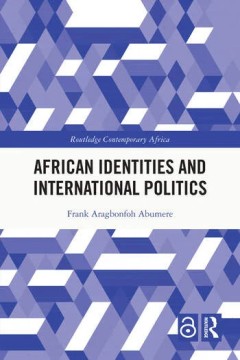Filter by

25 Years of Transformations of Higher Education Systems in Post-Soviet Countr…
USSR countries; Soviet higher education reform; Soviet higher education policy; Post-Soviet higher education; vertical system differentiation; horizontal system differentiation
- Edition
- -
- ISBN/ISSN
- 9783319529790
- Collation
- -
- Series Title
- -
- Call Number
- -

African identities and international politics
Using the lenses of realism, liberalism, the English School and constructivism, this book explains how the divisions and differences in African identities affect African international politics. This book explores the African condition in the twenty-first century. It analyses how geographical, racial, ethnic, linguistic, religious and power differences shape continental and intercontinental rel…
- Edition
- -
- ISBN/ISSN
- 9781003176732
- Collation
- 176
- Series Title
- -
- Call Number
- -

A United Nations Renaissance
This short introduction to the United Nations analyzes the organization as itis today, and how it can be transformed to respond to its critics. Combiningessential information about its history and workings with practical proposalsof how it can be strengthened, Trent and Schnurr examine what needs to bedone, and also how we can actually move toward the required reforms. Thisbook is written for a…
- Edition
- -
- ISBN/ISSN
- 9783847408604
- Collation
- oer.unej.ac.id
- Series Title
- -
- Call Number
- -

A Buddhist Approach to International Relations : Radical Interdependence
This book is an open access book. Many scholars have wondered if a non-Western theory of international politics founded on different premises, be it from Asia or from the "Global South," could release international relations from the grip of a Western, "Westphalian" model. This book argues that a Buddhist approach to international relations could provide a genuine alternative. Because of its di…
- Edition
- -
- ISBN/ISSN
- 978-3-030-68042-8
- Collation
- 107 hlm
- Series Title
- -
- Call Number
- -

African identities and international politics
- Edition
- -
- ISBN/ISSN
- -
- Collation
- -
- Series Title
- -
- Call Number
- -
- Edition
- -
- ISBN/ISSN
- -
- Collation
- -
- Series Title
- -
- Call Number
- -

Putting PIRLS to Use in Classrooms Across the Globe : Evidence-Based Contribu…
- Edition
- Volume 1
- ISBN/ISSN
- 978-3-030-95266-2
- Collation
- -
- Series Title
- -
- Call Number
- -
- Edition
- Volume 1
- ISBN/ISSN
- 978-3-030-95266-2
- Collation
- -
- Series Title
- -
- Call Number
- -

Young Citizens' Views and Engagement in a Changing Europe = IEA International…
This open access report presents the European results from the third cycle (2022) of the IEA International Civic and Citizenship Education Study (ICCS). Eighteen countries and two benchmarking participants (the German states of North Rhine-Westphalia and Schleswig-Holstein) administered the European student questionnaire to target grade students. The purpose of the European student questionnair…
- Edition
- -
- ISBN/ISSN
- 9783031716416
- Collation
- XII, 93 hlm; ill., lamp.,
- Series Title
- -
- Call Number
- -

Viability of UNCLOS amid Emerging Global Maritime Challenges
This open access book assesses UNCLOS' resilience and vitality as a legal framework for addressing emerging global maritime challenges. Against the backdrop of a number of emerging global maritime challenges, including the rise of sea levels and the maintenance of maritime safety and connectivity, the preservation of marine biodiversity of areas beyond national jurisdiction, and the promotion o…
- Edition
- -
- ISBN/ISSN
- 9789819758388
- Collation
- XVI, 201 hlm; ill., lamp.,
- Series Title
- -
- Call Number
- -

Ukraine's Journey to Recovery, Reform and Post-War Reconstruction = A Bluepri…
This open access volume explores Ukraine's challenges post-war, focusing on economic revival and sustainable development. Addressing scholars, policymakers, and practitioners the book discusses pivotal issues for the rebuilding of Ukraine, such as institutional changes, economic hurdles, social stability, and environmental rejuvenation. The book highlights the inevitable need for Ukraine's i…
- Edition
- -
- ISBN/ISSN
- 9783031664342
- Collation
- VIII, 315 hlm; ill., lamp.,
- Series Title
- -
- Call Number
- -

Ukraine’s Thorny Path to the EU = From “Integration without Membership”…
This interdisciplinary book takes stock of Ukraine’s thorny European integration path in the last two decades. Engaging many Ukrainian academics and practitioners, the book seeks to offer a first-hand insight into how Ukraine moves towards EU membership, while in war with Russia, and which ‘stumbling blocks’ it encounters.
- Edition
- -
- ISBN/ISSN
- 9783031691546
- Collation
- XIII, 327 hlm; ill., lamp.,
- Series Title
- -
- Call Number
- -
 Computer Science, Information & General Works
Computer Science, Information & General Works  Philosophy & Psychology
Philosophy & Psychology  Religion
Religion  Social Sciences
Social Sciences  Language
Language  Pure Science
Pure Science  Applied Sciences
Applied Sciences  Art & Recreation
Art & Recreation  Literature
Literature  History & Geography
History & Geography